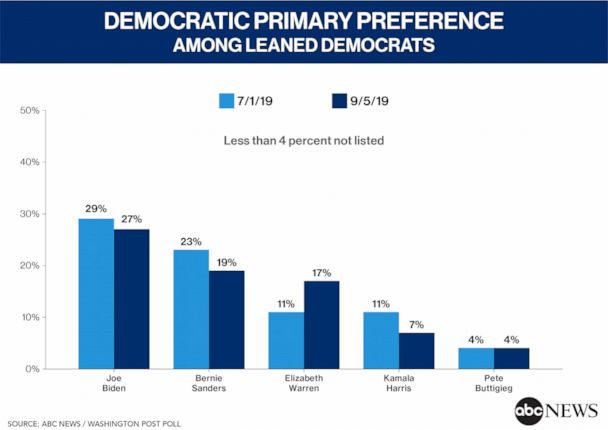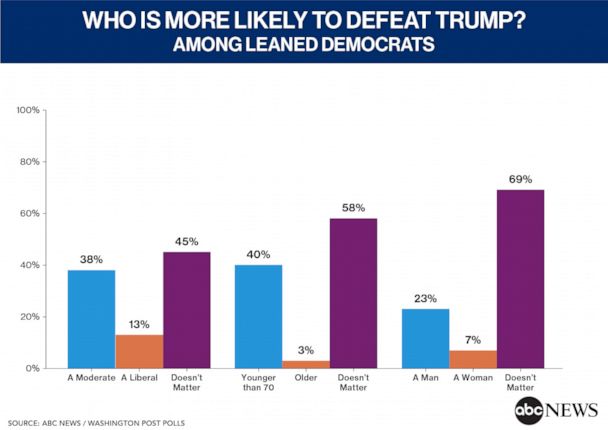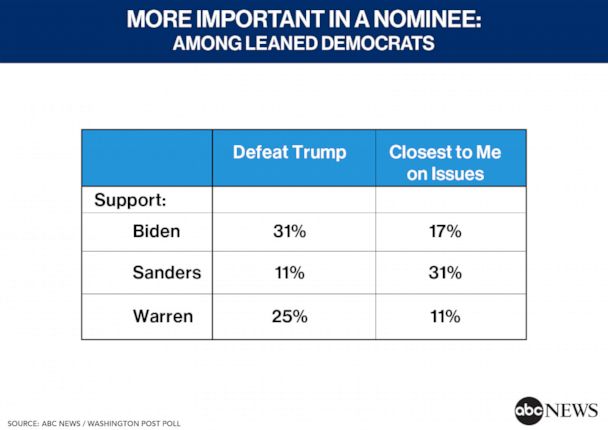Warren gains, Harris slips -- and the room for movement is vast
A gain for Elizabeth Warren and a slip in support for Kamala Harris.
A gain for Elizabeth Warren and a slip in support for Kamala Harris place Joe Biden, Bernie Sanders and Warren atop the field in the latest ABC News/Washington Post poll, days in advance of the Sept. 12 Democratic debate in Houston, sponsored by ABC and Univision.
The poll finds Biden, this summer’s front-runner, far better rated for electability than for being “the best president for the country.” Still, his supporters are more committed than those of other candidates, and electability has advanced as a priority, helping him hold his ground -- albeit not advance.
See PDF for full poll results, charts and tables.
Biden has support from 27 percent of Democrats and Democratic-leaning independents in the national survey, compared with 19 percent for Sanders and 17 percent for Warren. The rest of the field is in the single digits, including 7 percent for Harris, 4 percent for Pete Buttigieg and 3 percent apiece for Beto O’Rourke and Andrew Yang. All others are at 1 percent or less in this poll, produced for ABC by Langer Research Associates.

Narrowing to registered voters -- although there’s plenty of time to register -- shows similar results, with Biden-Sanders-Warren at 29-19-18 percent and Harris again at 7 percent. Two candidates, Tulsi Gabbard and Amy Klobuchar, inch to 2 percent.
The only meaningful shifts are +6 points for Warren from her 11 percent support in early July, while Harris has lost a slight 4 points (6 points among those registered to vote). Warren gained, in particular, in the Northeast (where the Massachusetts senator has 28 percent support), in urban areas (22 percent) and among liberals (27 percent), while Harris lost 10 points among seniors, a Biden stronghold.
Committed?
The race has vast room to move: A minority of Democrats and Democratic leaners, 43 percent, say they’re committed to their current candidate as long as he or she stays in the race. Fifty-five percent instead say they’d consider switching horses.
Biden benefits from higher levels of commitment. Among his backers, 64 percent say they’ll definitely support him, while 34 percent say they’d consider supporting another candidate.
These numbers are reversed for the rest of the field. Among all other candidates’ supporters combined, just 34 percent are definitely for their current choice, while 64 percent say they’d consider someone else. While the samples are small, Sanders and Warren are essentially as vulnerable as the lower-tier candidates on this measure of committed support.
All this leaves a huge pool of potential movers: Sixty-one percent of all leaned Democrats either say they could change their support, or don’t have a current preference.
Electability/Suitability
Biden also holds a continued advantage in perceived electability. Forty-two percent see him as the candidate with the best chance to defeat Donald Trump, essentially unchanged from 45 percent in July despite lackluster debate and campaign performances. That puts him far ahead of Sanders, at 14 percent, and Warren, at 12 percent (up 5 points from July) in this gauge.
All others barely register. Notably, Harris is down 7 points in the view that she’s the most electable Democrat, dropping from 9 percent in July (after a well-received first debate performance) to 2 percent.

Suitability, rather than electability, is Biden’s weaker card. Far fewer, 23 percent, say he would be “the best president for the country,” barely more than half as many who see him as most electable. Nearly as many pick Warren as the candidate who’d make the best president, 19 percent, with 16 percent for Sanders and the rest of the candidates again registering in the single digits.
That said, electability has grown in importance. In an ABC/Post poll last spring, 39 percent of leaned Democrats said it was more important to them that the party nominate the candidate who seems most likely to defeat Trump, as opposed to the one closest to them on the issues. Today 50 percent put the priority on defeating Trump, while 41 percent are more concerned about proximity on the issues.
In part because fewer are now undecided on this question, the shift to a greater focus on electability is substantial in some groups – up 20 points from April among women and college graduates alike, as well as up 17 points among whites and those with higher incomes.
Attributes
An additional result shows a potential vulnerability for all three frontrunners: Four in 10 leaned Democrats say a candidate younger than 70 is likelier than an older nominee to defeat Trump. Just three percent give the edge to an older candidate, while 58 percent see no difference. Warren is 70, Biden is 76 and Sanders turns 78 today.

Another result regarding attributes benefits Biden, with 38 percent seeing a moderate as more likely to defeat Trump, while 13 percent think a liberal nominee is likelier to win. That’s even though a plurality of leaned Democrats themselves are liberals, 46 percent, versus 43 percent being moderates and 10 percent being conservatives.
Among other attributes, leaned Democrats see a man as likelier than a woman to defeat Trump, 23 versus 7 percent, and a straight person as more apt than a gay candidate to win, 29 versus 1 percent – although in both cases 69 percent think it makes no difference. The smallest difference is in perceived electability of a candidate who’s white compared with one who is a racial or ethnic minority, 15 percent versus 6 percent, with 78 percent seeing no difference.
Groups
Biden owes much of his advantage to blacks, with 44 percent support, about double his level among whites and Hispanics alike. (Results among blacks and Hispanics are from the last two ABC/Post polls combined for more robust sample sizes.)
Biden also holds a clear lead among moderates, with 33 percent support, while he runs about evenly with Sanders and Warren among liberals. And a persistent age gap continues: Biden’s support peaks by age at 41 percent among seniors (with just 5 percent for Sanders), while Sanders in turn has 41 percent among 18- to 29-year olds, Biden about half that.
Sanders also is especially strong among those who prefer a nominee who’s closest to them on the issues, rather than most likely to beat Trump. Warren, even though she’s positioned herself as highly issue-focused, does better with those more concerned with beating Trump, as does Biden.
Favorability
It’s notable that all three of the top-running candidates are well regarded in their party. Eighty-two percent of leaned Democrats express an overall favorable opinion of Sanders, 79 percent feel favorable toward Biden and 74 percent feel favorable about Warren (with more undecided, as she she’s less well-known). Harris and Buttigieg, also tested for favorability, score somewhat lower at 63 and 53 percent, respectively, but that’s chiefly because more people have no opinion of them. Indeed, all five of these candidates are seen unfavorably by just 11 percent (Warren) to 16 percent (Harris).
Flip those scores around to find what unites leaned Democrats: Donald Trump. Eighty-nine percent see him unfavorably, while 8 percent view him favorably. Indeed, 80 percent of leaned Democrats have a “strongly” unfavorable opinion of Trump -- vastly more than have a strongly favorable view of any of their own candidates.
Methodology
This ABC News/Washington Post poll was conducted by landline and cellular telephone, Sept. 2-5, 2019, in English and Spanish, among a random national sample of 1,003 adults. Results have a margin of sampling error of 5.5 points, including the design effect, for the sample of 437 Democrats and Democratic-leaning independents covered in this report. Partisan divisions in the full sample are 28-24-37 percent, Democrats-Republicans-independents.
The survey was produced for ABC News by Langer Research Associates of New York City, with sampling and data collection by Abt Associates of Rockville, Maryland. See details on the survey’s methodology here.